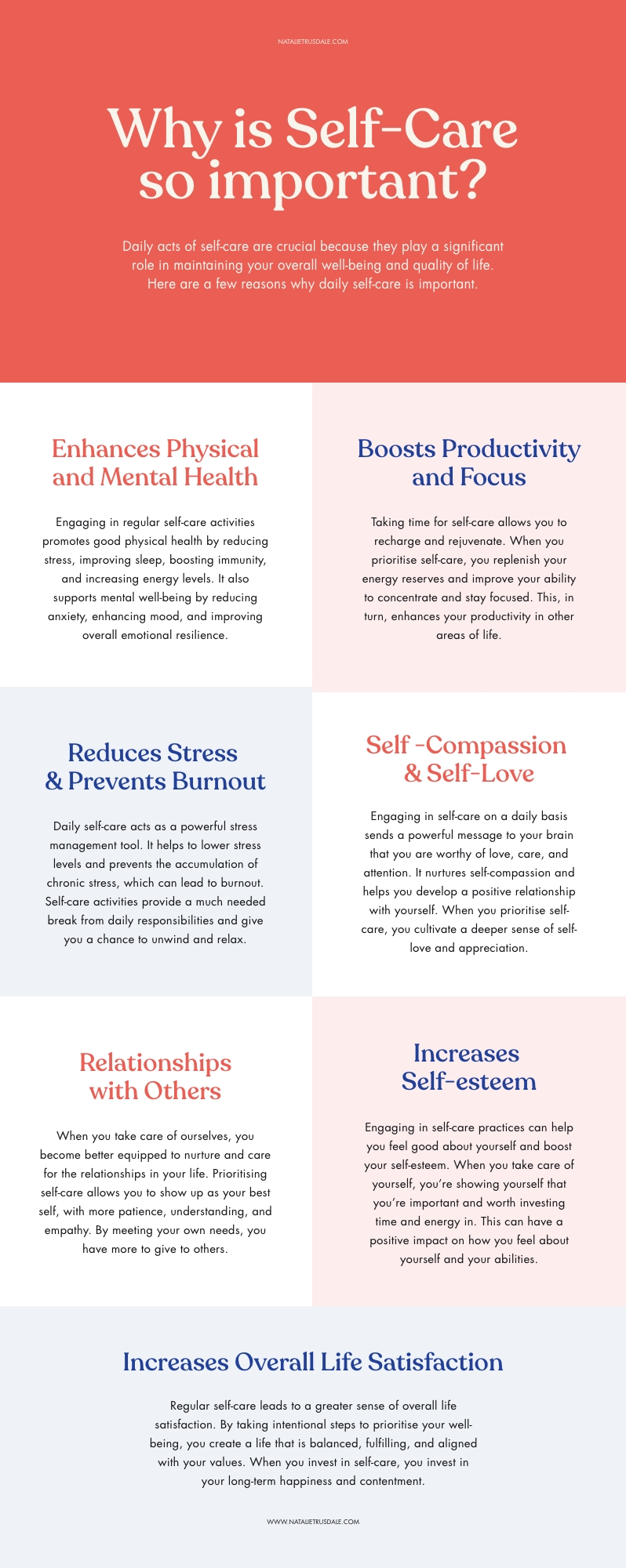Do you find that you struggle to make time for yourself?
You plan it, you put it into your diary, but for some reason, it just never seems to happen.
I know if you’re reading this that you want a little more “me time”. However, perhaps you’re finding it hard to squeeze it into your busy life. There is always something else stealing your attention, time or energy and you drop down on your priority list.
But self-care doesn’t have to take long, be complicated or become another source of stress in life. Today I’m going to share with you how to make your self-care simple and something that actually meets your needs.
Why is Self-Care so important?
Daily acts of self-care are crucial because they play a significant role in maintaining your overall well-being and quality of life. Here are a few reasons why daily self-care is important.
Enhances Physical and Mental Health
Engaging in regular self-care activities promotes good physical health by reducing stress, improving sleep, boosting immunity, and increasing energy levels. It also supports mental well-being by reducing anxiety, enhancing mood, and improving overall emotional resilience.
Boosts Productivity and Focus
Taking time for self-care allows you to recharge and rejuvenate. When you prioritise self-care, you replenish your energy reserves and improve your ability to concentrate and stay focused. This, in turn, enhances your productivity in other areas of life.
Reduces Stress and Prevents Burnout
Daily self-care acts as a powerful stress management tool. It helps to lower stress levels and prevents the accumulation of chronic stress, which can lead to burnout. Self-care activities provide a much needed break from daily responsibilities and give you a chance to unwind and relax.
Cultivates Self-Compassion and Self-Love
Engaging in self-care on a daily basis sends a powerful message to your brain that you are worthy of love, care, and attention. It nurtures self-compassion and helps you develop a positive relationship with yourself. When you prioritise self-care, you cultivate a deeper sense of self-love and appreciation.
Improves Relationships with Others
When you take care of ourselves, you become better equipped to nurture and care for the relationships in your life. Prioritising self-care allows you to show up as your best self, with more patience, understanding, and empathy. By meeting your own needs, you have more to give to others.
Increases self-esteem
Engaging in self-care practices can help you feel good about yourself and boost your self-esteem. When you take care of yourself, you’re showing yourself that you’re important and worth investing time and energy in. This can have a positive impact on how you feel about yourself and your abilities.
Increases Overall Life Satisfaction
Regular self-care leads to a greater sense of overall life satisfaction. By taking intentional steps to prioritise your well-being, you create a life that is balanced, fulfilling, and aligned with your values. When you invest in self-care, you invest in your long-term happiness and contentment.

5 Tips to Make your Self-Care Simple
I hope you can now see why self-care is important and how it can help you in your daily life. So, let’s talk about 5 ways to make your self-care so simple that you can practice it daily, without breaking a sweat…
1. Understand what you need
When it comes to practicing self-care, it’s easy to seek advice from others and gather ideas about what self-care looks like for them. This can be helpful as it exposes you to new ideas and expands your understanding of self-care.
However, there are a couple of pitfalls you need to be mindful of. Firstly, there’s a risk of engaging in self-care activities that cater to someone else’s needs but not your own. Secondly, you may become rigid in your self-care routine, sticking to a predetermined set of activities, without considering the ever-changing nature of your own needs.
The truth is, our physical, mental, and emotional needs fluctuate from day to day. What you require for your body, mind, and overall well-being varies depending on your energy levels, emotional state, and daily circumstances. To address this, it’s important to approach self-care with flexibility and regularly ask yourself a vital question – What do I need?
Rather than blindly following a generic self-care routine, take a moment each day to assess your current needs. Consider how you feel, the challenges you may be facing, and the level of energy you have available. By being in tune with yourself and prioritising your unique needs, you can craft a tailored self-care practice that truly nurtures and supports you.
2. Make sure your Self-Care is realistic
When embarking on a journey of prioritising self-care, we often dive in with unwavering enthusiasm and a determination. You join the gym and commit to daily intense workouts, or incorporate lengthy meditation sessions into your morning routine, convinced that more is better. However, this all-or-nothing mentality can lead to exhaustion and ultimately derail your self-care efforts.
To ensure that your self-care practices are sustainable and achievable, it’s essential to be realistic. This means considering your current life circumstances, responsibilities, and commitments. It’s not about diminishing your own importance or placing yourself at the bottom of the priority list. Rather, it’s about understanding the limitations and resources you might have at this moment.
Instead of overwhelming yourself with unrealistic expectations, it’s far more effective to start small and build from there. Even starting with once or twice a week can make a significant difference. By gradually integrating manageable habits into your routines, you increase the likelihood of maintaining them long-term.
Self-care doesn’t have to be extravagant or time consuming. What matters is finding what is realistic for you. Whether it’s five minutes here and there throughout the day or an hour in the evening, the key is to fit it into your life, in a way that works for you. It’s better to have consistent, achievable moments of self-care than to struggle with an overwhelming schedule that quickly becomes unsustainable.
3. Make your Self-Care enjoyable
When it comes to self-care, it’s not uncommon for people to find it stressful, boring, or confusing. Often, this can be attributed to a lack of personalisation and an overemphasis on external recommendations or societal expectations. To truly make self-care enjoyable, you must shift your perspective and focus on what brings you joy and fulfilment.
Instead of limiting self-care to predefined ideas of what it should look like, embrace the freedom to explore and discover activities that genuinely resonate with you. If roller skating down the pier sparks excitement within you, go ahead and do it. If rock climbing, practicing yoga, or taking a leisurely walk on the beach with your dog brings you joy, embrace those activities wholeheartedly. Even dancing in your kitchen can be a form of self-care if it brings a smile to your face.

There are no strict rules when it comes to self-care, except the ones we impose upon ourselves. By releasing expectations you increase the likelihood of being consistent with it and feel happier along the way. Self-care is a dynamic and ever-evolving practice that should adapt to your changing needs, preferences, and practical considerations.
The key is to make self-care an enjoyable experience that you genuinely look forward to. When self-care becomes just another item on your to-do list, it becomes challenging to maintain consistency.
4. Remember that Self-Care isn’t just physical
Self-care encompasses much more than just physical practices. In my personal journey, I discovered that solely focusing on physical aspects often perpetuated negative feelings about my body. This was driven by the toxic influence of calorie counting, weight loss, and societal pressures imposed by diet culture. It was essential for me to broaden my perspective and embrace a more holistic approach to self-care. I’m here to urge you to do the same.
Physical self-care is important but it’s crucial to recognise that self-care extends far beyond your physical self. If you struggle with negative self-talk or thought patterns, incorporating practices that calm and nourish the mind is important.
Activities like yoga, meditation, mindful walks in nature, or simply sitting quietly can provide immense benefits to your overall well-being. These practices shift the focus from altering or improving your physical appearance to nurturing your mental and emotional health.
When embarking on a self-care journey, it’s essential to avoid narrowing your focus solely on physical changes or external transformations. It’s important to explore and prioritise activities that address your mental and emotional well-being. By expanding your definition of self-care, you will create a more holistic and enriching experience that supports your overall well-being.
5. A little bit of Accountability goes a long way
When it comes to practicing self-care, a little bit of accountability can make a world of difference. Consider finding a buddy or seeking companionship, if it suits you and is feasible. This introduces accountability, which motivates you to follow through with your intentions, but also serves to meet other essential needs.
Accountability provides a powerful incentive to take action. I know I find myself more likely to engage in self-care when I share my plans with someone else. When others are involved it can be a strong driving force to stay consistent and committed to our self-care practices.

Moreover, when you buddy up for self-care activities, it opens up opportunities to meet additional needs. Going for a walk with a friend allows you to move your body, but also feel connected. Merging different needs and desires with your self-care routines, creates a more enriching and fulfilling experience.
Self-Care creates a Happier, Healthier You
Practicing self-care can be challenging, especially if you’re struggling with low self-esteem or have body image issues. Negative self-talk, self-neglect, perfectionism, shame, guilt, and the fear of judgment can often hinder the ability to prioritise self-care.
If you struggle with negative self-talk, time constraints, or feelings of unworthiness, remember that self-care is vital and you don’t need to ‘earn it’. Overcoming these challenges and making self-care a priority can have a profound impact on your overall well-being and confidence.
If you’re seeking support and accountability in a safe space, I’d love to welcome you my free, private Facbook Group, The Self-Esteem Society. Here you’ll find a community of like-minded individuals on a similar journey, all ready to support each other in their growth. Just click on the button below to join.
And for now, make a conscious effort to take some time for yourself. I promise you, you’ll feel great for it.

Hey I’m Natalie, Supporting women like you on their road to self-acceptance and building a positive body image.

View comments
+ Leave a comment